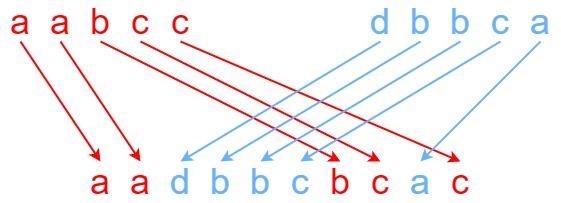Given strings s1, s2, and s3, find whether s3 is formed by an interleaving of s1 and s2.
An interleaving of two strings s and t is a configuration where they are divided into non-empty substrings such that:
s = s1 + s2 + ... + snt = t1 + t2 + ... + tm|n - m| <= 1- The interleaving is
s1 + t1 + s2 + t2 + s3 + t3 + ...ort1 + s1 + t2 + s2 + t3 + s3 + ...
Note: a + b is the concatenation of strings a and b.
Example 1:
Input: s1 = "aabcc", s2 = "dbbca", s3 = "aadbbcbcac" Output: true
Example 2:
Input: s1 = "aabcc", s2 = "dbbca", s3 = "aadbbbaccc" Output: false
Example 3:
Input: s1 = "", s2 = "", s3 = "" Output: true
Constraints:
0 <= s1.length, s2.length <= 1000 <= s3.length <= 200s1,s2, ands3consist of lowercase English letters.
Follow up: Could you solve it using only O(s2.length) additional memory space?
class Solution:
def isInterleave(self, s1: str, s2: str, s3: str) -> bool:
m, n = len(s1), len(s2)
if m + n != len(s3):
return False
@lru_cache
def dfs(i, j):
if i == m and j == n:
return True
return i < m and s1[i] == s3[i + j] and dfs(i + 1, j) or \
j < n and s2[j] == s3[i + j] and dfs(i, j + 1)
return dfs(0, 0)class Solution {
private int m;
private int n;
private String s1;
private String s2;
private String s3;
private Map<Integer, Boolean> memo = new HashMap<>();
public boolean isInterleave(String s1, String s2, String s3) {
m = s1.length();
n = s2.length();
this.s1 = s1;
this.s2 = s2;
this.s3 = s3;
if (m + n != s3.length()) {
return false;
}
return dfs(0, 0);
}
private boolean dfs(int i, int j) {
System.out.println(i + ", " + j);
if (i == m && j == n) {
return true;
}
if (memo.containsKey(i * 100 + j)) {
return memo.get(i * 100 + j);
}
boolean ret = (i < m && s1.charAt(i) == s3.charAt(i + j) && dfs(i + 1, j)) ||
(j < n && s2.charAt(j) == s3.charAt(i + j) && dfs(i, j + 1));
memo.put(i * 100 + j, ret);
return ret;
}
}class Solution {
public:
bool isInterleave(string s1, string s2, string s3) {
int m = s1.size(), n = s2.size();
if (m + n != s3.size()) return false;
unordered_map<int, bool> memo;
function<bool(int, int)> dfs;
dfs = [&](int i, int j) {
if (i == m && j == n) return true;
auto it = memo.find(i * 100 + j);
if (it != memo.end()) return it->second;
bool ret = (i < m && s1[i] == s3[i + j] && dfs(i + 1, j)) ||
(j < n && s2[j] == s3[i + j] && dfs(i, j + 1));
memo[i * 100 + j] = ret;
return ret;
};
return dfs(0, 0);
}
};func isInterleave(s1 string, s2 string, s3 string) bool {
m, n := len(s1), len(s2)
if m+n != len(s3) {
return false
}
memo := make(map[int]bool)
var dfs func(int, int) bool
dfs = func(i, j int) bool {
if i == m && j == n {
return true
}
if v, ok := memo[i*100+j]; ok {
return v
}
ret := (i < m && s1[i] == s3[i+j] && dfs(i+1, j)) ||
(j < n && s2[j] == s3[i+j] && dfs(i, j+1))
memo[i*100+j] = ret
return ret
}
return dfs(0, 0)
}
